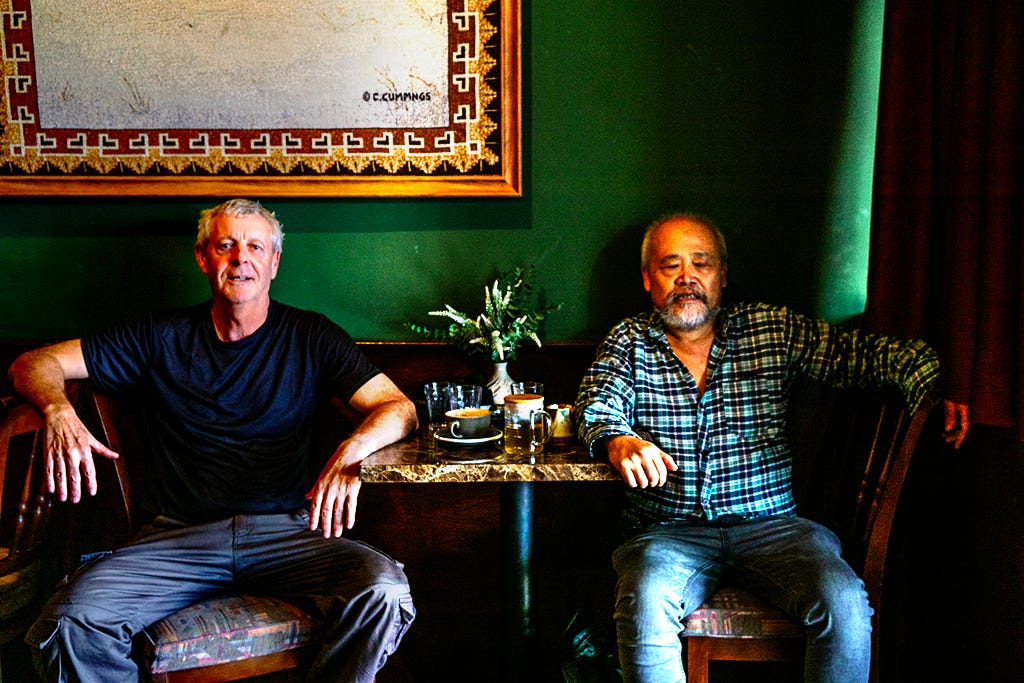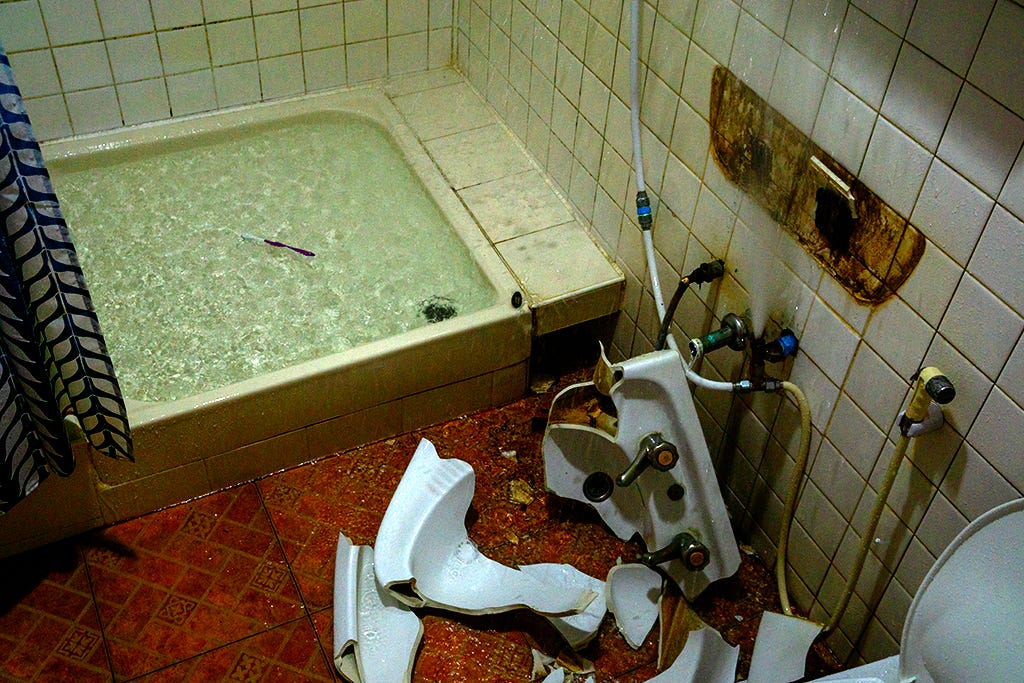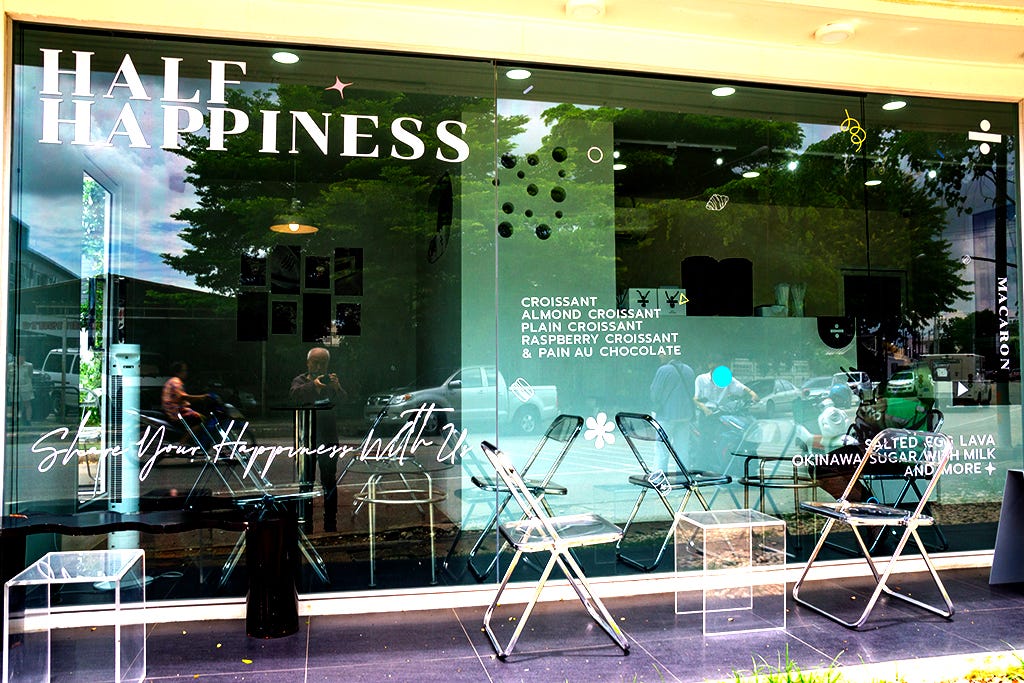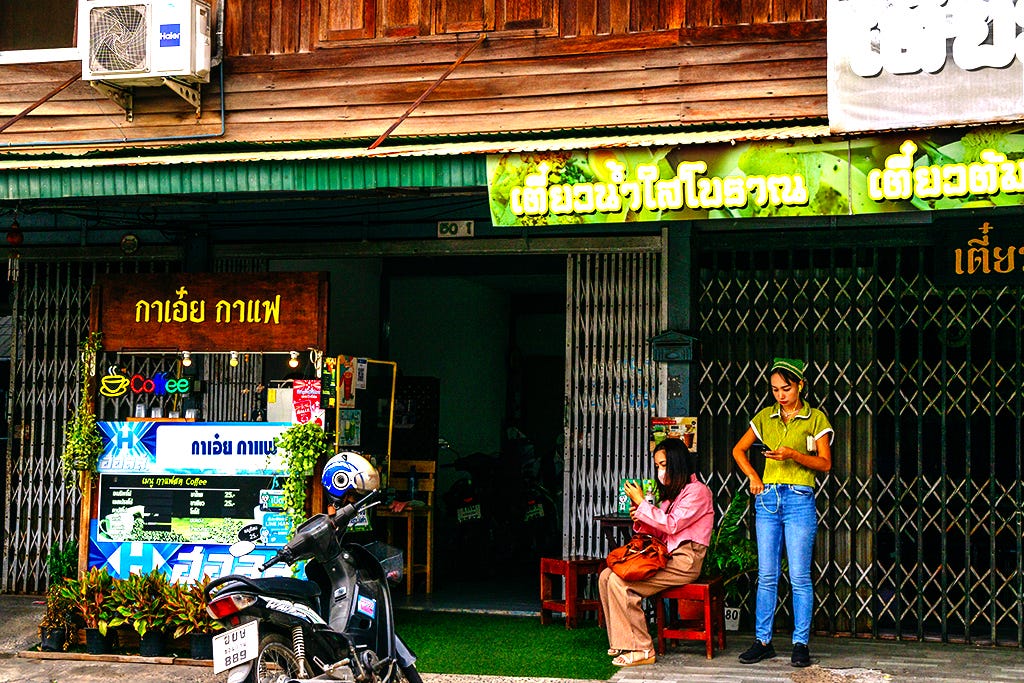[Ubon Ratchathani, 7/8/23]
On 7/8/23, I got this message at SubStack, “Linh. I am visiting Ubon from Australia. I am right now sitting in Attaroast drinking coffee. I would like to meet you if you are feeling sociable.”
In Serbia, North Macedonia, Albania, South Africa, Laos, Thailand and Vietnam, I’ve met readers. It’s nice, though every audience is ephemeral. After a few glances in your direction, they move on, then disappear without a trace, and so will you.
Through my open window, I hear a pleading male voice accompanied by a thoughtful guitar. On this rent-a-planet, all performances are ghostly.
On 7/8/23, I replied to the Australian, “By the time I managed to hobble to Attaroast, you were gone!” Half an hour later, we did meet, when he returned from wandering around the block.
67-years-old, Mark was born in Hobart, Tasmania. After two decades as a securities trader in Sydney, he got sick of that shady scene, so returned to Tasmania to become a truck driver, with a stint steering a taxi. When Jewjabs were mandated in 2021, Mark lost his job. At least 95% of Aussies have been Jewjabbed at least twice, so forget that image of Australia as the last frontier sheltering free spirits.
Mark, “Tasmania was the first place on earth to mandate seatbelts.” Also, “About 20 years ago, I noticed people would say, “Be safe!” or “Stay safe!” as they got out of my taxi. Mostly young people would say this. I never heard that before.”
With Asia so close, millions of Aussies have visited this continent. Pre-Covid, 800,000 Aussies arrived in Thailand each year. Mark has also been to Myanmar, Vietnam, Malaysia and Japan. Plus, he’s traveled to Dubai, USA, Mexico, seven or eight European countries, plus a handful of Pacific islands. Mark’s never been to Laos, however, so I suggested he go to Vientiane after Ubon.
Me, I was just waiting for my skin to heal enough so I could return to Pakse. I was looking forward to writing at that heavy table outside Lankham Hotel again, but with no sugar in my coffee. My beloved Beerlao would also be banished. A pasta meal at Dok Mai Lao could still be indulged, though, if only occasionally.
The morning after meeting Mark, my plan was changed. In my health hell, it takes hours to get dressed in the morning, for I have to massage my legs for at least an hour just to get out of bed. Standing up is punished with extreme pain, but I’ve brought all this upon myself. For decades, I treated my skin problem superficially, without addressing its root cause.
Finally in the bathroom, I never got around to brushing my teeth because the heavy sink crashed from the wall! Granted, I’d been putting a lot of weight on it, but I’m not a Samoan sumo wrestler. For seven plus decades, countless travelers have used it to do their laundry, so this sink had had to endure millions of downward motions. Choosing me to startle, it shattered around my feet. Had my poor toes been broken, I wouldn’t be sitting here, typing this.
[Ubon Ratchathani, 7/9/23]
My stay in Ubon had been a chain of unpleasantnesses and disasters, so I finally had enough. Meeting Mark again in Attaroast, I said I would go with him to Vientiane. Mark welcomed the idea.
Before arriving in Ubon, I had written on 6/18/23, “I may reenter Laos at Vientiane. With much more history, Vientiane has a gravity and dignity Pakse simply lacks. When you sit in the shadow of the Black Stupa, you can just die happy.” Let’s hope my wish fulfilment won’t be that literal, but who knows.
Leaving Ubon, we took a five-hour bus to Khon Kaen, where we intended to stay one night. Since this city of 120,000 has turned out so charming, we’ve added another night. My $20 room at Fun-D City View is comfortable and cheery. Nothing is collapsing. Tomorrow, we’ll take a train to Vientiane, with its solemn Black Stupa. All alone, it lords over surrounding houses and cafes.
On the bus, Mark told me about a close friend who had Huntington’s disease. Though hereditary, there’s still a 50% chance you’ll be spared.
Also a securities trader, this man, let’s call him Chistian, was reasonably well-off when he got married. Christian had told his fiancé about Huntington’s disease ravaging through his family, but she, a nurse, was unfazed, so they took the vow.
In his mid-40’s, it struck. It would take Christian a decade to die, though. Halfway through his ordeal, his wife dumped him, because, she said, their two kids shouldn’t have to witness his deterioration. Despite the children’s protest, she proceeded with the divorce. A judge awarded her their huge house.
In pain and misery, Christian decided to end his life, so he asked three friends on the best way to do this. Go to Switzerland, they told him. Assisted suicides are legal there. Before this could be arranged, Christian’s ex-wife got wind of it, so she threatened to sue Christian’s friends for helping to kill him. Why she even cared, no one knows.
With death in Europe no longer, ah, viable, Mark decided to take Christian to Vietnam for a relaxing vacation. Landing in chaotic Saigon, they realized it was a mistake, since just crossing the street seemed impossible. Staying in the city’s most touristy neighborhood, the slow-moving Christian was constantly swarmed by hustlers, bargirls and beggars. Without knowing Christian’s condition, they seemed determined to help him die.
A solution was found when they moved into a resort. As Mark played golf, Christian watched. Back in Australia, Christian died two years later when he stopped eating.
On August 15th, Vietnam will issue three-month visas again, so I will probably return to Vung Tau in September. Leaving that soothing seaside city last November, I thought I’d be away two or three months, but my extended travel, with its mishaps, has been good for my work, so I’m grateful.
Last time in Vientiane, I stumbled upon a corpse just cremated. I also looked at many stupa graves at Buddhist temples. Most intriguing were those belonging to foreigners. Among a sea of yellow faces, there would suddenly appear a white one, and why not? Had he been buried at home, so to speak, he’d still be less than a ghost.
[Khon Kaen, 7/11/23]
[Khon Kaen, 7/11/23]
[Khon Kaen, 7/11/23]








A very sad story about Christian. His ex is absolutely heartless ditching him at the very time he needed someone, and taking his kids away, no less. At least Mark was a good friend.
I hope your medical issues can clear up soon. Sometimes when you have a medical issue it can be very difficult to figure out what to do about it, even when you think you know where it came from.
linh, thank you for keeping us posted on your adventures, both pleasant and less-pleasant
in one of the photos posted here, a woman is wearing a t-shirt with the words "begin again"
this is a phrase from a rolling stones song - here it is with the chords above the lyrics - this is a song about satcitananda - being, consciousness, bliss - or so i think - i could be wrong
She Smiled Sweetly - The Rolling Stones
Between The Buttons (1967)
Written by Jagger/Richards
[Verse 1]
C G C F C
Why do my thoughts loom so large on me?
G G7 C F
They seem to stay for day after day.
G G7 C F
And won't disappear, I've tried every way.
[Chorus]
C G Am
But she smiled sweetly,
F Em Dm
She smiled sweetly,
F G C
She smiled sweetly,
G C F C
And says don't worry,
G C F C G
Oh no no no
[Verse 2]
C G C F C
Where does she hide it inside of her?
G G7 C F
That keeps her peace most every day.
G G7 C F
And won't disappear, my hair's turning gray.
[Chorus]
C G Am
But she smiled sweetly,
F Em Dm
She smiled sweetly,
F G C
She smiled sweetly,
G C F C G
And says don't worry.
[Bridge]
C F C G C C*
G C F C
There's nothing in why or when.
G C Dm F
There's no use trying, you're here,
G G7
Begin again, and o'er again.
[Verse 3]
C G C F C
That's what she said so softly
G G7 C F
I understood for once in my life
G G7 C F
And feeling good most all of the time
[Chorus]
C G Am
'Cause she smiled sweetly
F Em Dm
She smiled sweetly,
F G C
She smiled sweetly,
G C F C
And said don't worry,
G C F C
Oh no no no,
G C F C
Oh no no no,
G C
Oh no no no